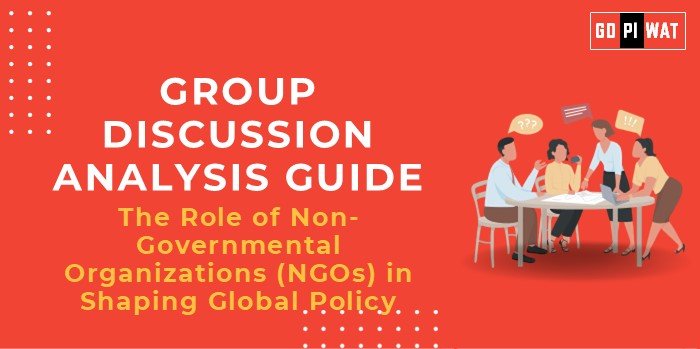📋 Group Discussion (GD) Analysis Guide
🌟 The Role of Non-Governmental Organizations (NGOs) in Shaping Global Policy
🌐 Introduction to the Topic
Opening Context: Non-governmental organizations (NGOs) have emerged as powerful agents of change in global governance, bridging gaps where governments and corporations fall short. From climate action to human rights, NGOs influence policy on critical global issues.
Topic Background: NGOs gained prominence during the 20th century, particularly after World War II, when international institutions like the UN began incorporating civil society’s voices. Today, their expertise, advocacy, and grassroots connections are indispensable in addressing transnational challenges.
📊 Quick Facts and Key Statistics
- 🌍 Global NGO Count: Over 10 million worldwide, highlighting their widespread reach and influence.
- 🌱 Climate Advocacy: NGOs played a crucial role in the Paris Agreement negotiations (2015), influencing 190+ nations.
- 💰 Development Funding: NGOs manage $187 billion annually for global development programs (OECD, 2023).
- 🚑 Humanitarian Aid: 60% of emergency assistance worldwide is delivered by NGOs, including organizations like the Red Cross and Médecins Sans Frontières.
👥 Stakeholders and Their Roles
- 🏢 NGOs: Advocate for policy change, provide expertise, and implement grassroots programs.
- 🏛️ Governments: Collaborate with NGOs for policy implementation and funding.
- 🌐 International Bodies: Incorporate NGO input into frameworks like the UN SDGs and climate accords.
- 💼 Private Sector: Partners with NGOs for corporate social responsibility (CSR) and sustainable development initiatives.
🏆 Achievements and Challenges
- 🎯 Achievements:
- Climate Action: Influenced landmark agreements, including COP26 and COP27.
- Health Initiatives: The Bill & Melinda Gates Foundation significantly reduced malaria cases through funding and programs.
- Human Rights Advocacy: Amnesty International and Human Rights Watch shaped global norms and legislation against torture and oppression.
- ⚠️ Challenges:
- Funding Dependency: Many NGOs rely on government and donor funding, risking loss of autonomy.
- Accountability Issues: Critics argue some NGOs lack transparency in operations and finances.
- Political Pushback: Governments in countries like India and Russia have imposed restrictions on NGOs’ activities.
🌍 Global Comparisons
- 🌟 Success: NGOs like Greenpeace in Europe successfully lobbied for renewable energy policies.
- 🌍 Struggles: In restrictive environments like China, NGOs face severe limitations on their influence.
Case Studies:
- 🌐 Global Fund: A collaboration of NGOs, governments, and private entities combating HIV, TB, and malaria globally.
- 🌍 Oxfam: Advocacy for tax justice influenced policy reforms in several nations.
📋 Structured Arguments for Discussion
- ✔️ Supporting Stance: “NGOs amplify marginalized voices, drive policy innovation, and ensure accountability in global governance.”
- ❌ Opposing Stance: “NGOs often face challenges like funding dependency and political restrictions, which limit their effectiveness.”
- ⚖️ Balanced Perspective: “While NGOs contribute significantly to global policy, addressing challenges like accountability and autonomy is essential for maximizing their impact.”
🛠️ Effective Discussion Approaches
- 🔍 Opening Approaches:
- Highlighting NGOs’ role in climate agreements like the Paris Accord.
- Presenting data on NGO funding and reach in global development.
- 💬 Counter-Argument Handling:
- Rebuttal: “While some NGOs face accountability challenges, initiatives like the International Aid Transparency Initiative (IATI) aim to improve oversight.”
- Example: The World Wildlife Fund’s (WWF) partnership with governments has enhanced conservation policies globally.
📈 Strategic Analysis of Strengths and Weaknesses
- 🟢 Strengths:
- Grassroots connections.
- Advocacy expertise.
- Adaptability to crises.
- 🟡 Weaknesses:
- Reliance on funding.
- Varying operational standards.
- Political resistance.
- 🔵 Opportunities:
- Partnerships with international bodies.
- Tech-enabled advocacy.
- Cross-border collaboration.
- 🔴 Threats:
- Political crackdowns.
- Donor fatigue.
- Misinformation campaigns.
📚 Connecting with B-School Applications
- 🌏 Real-World Applications: Topics like CSR, global governance, and ESG align well with NGO roles, offering insights for B-school projects and internships.
- 🤔 Sample Interview Questions:
- “How do NGOs shape corporate sustainability strategies?”
- “Evaluate the role of NGOs in achieving the UN Sustainable Development Goals.”
- 💡 Insights for Students:
- NGOs are critical stakeholders in public-private partnerships and can provide valuable learning opportunities in leadership and strategy.


